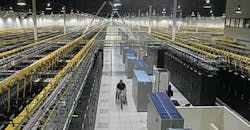QTS signs 20-year Renewable PPA to fund Solar for Data Centers in Georgia
Global data solutions firm QTS Realty Trust has signed up for a 20-year subscription to renewable energy in Georgia.
The company’s power purchase agreement with utility Georgia Power helps invest in 350 MW worth of renewables added to the grid in support of its Atlanta-Metro and Suwanee data center campuses. The investment will help fund new solar facilities being located in the state.
Although the renewables don’t necessarily go directly to electrify the data center campuses, the investment does support Georgia Power’s renewable energy project building. The PPA also is part of the utility’s overall customer renewable supply procurement (CRSP) tariff, making 1 GW in renewables available for subscription by commercial and industrial (C&I) customers.
“Georgia Power is pleased to provide QTS, the largest customer participating in the CRSP program to date, access to low cost renewable energy as part of our diverse energy mix,” said Wilson Mallard, Director of Renewable Development at Georgia Power. “Working with the Georgia PSC to develop and approve offerings, we are focused on growing cost-effective renewable energy options for all customers.”
Related stories
Data keeper Iron Mountain selects ClearTrace to track Energy and Carbon use at centers
How Data Centers will support Renewable Power Adoption
New Colorado Data Center to include Microgrid
Subscribe to EnergyTech's free Newsletter for more Insights into the C&I Energy Transition
The Georgia Power deal with QTS takes effect in 2024, pushing the renewable power going to the data centers up to 90 percent of total power delivered, according to the release.
“Georgia Power has been a trusted energy provider to QTS since we opened our first data center in Atlanta in 2005,” said Travis Wright, Vice President, Energy and Sustainability, QTS. “As the data center market leader in Atlanta, we have worked closely with Georgia Power to expand the availability of renewable energy sources through innovative programs like CRSP. This new agreement represents an important milestone as part of QTS’ documented commitment to procure 100% of our power from renewable energy sources by 2025.”
QTS has more than 20 data centers located across 10 states and the Netherlands. Many of those sites have PPAs for renewable energy procurement.
About the Author
Rod Walton, EnergyTech Managing Editor
Managing Editor
For EnergyTech editorial inquiries, please contact Managing Editor Rod Walton at [email protected].
Rod Walton has spent 17 years covering the energy industry as a newspaper and trade journalist. He formerly was energy writer and business editor at the Tulsa World. Later, he spent six years covering the electricity power sector for Pennwell and Clarion Events. He joined Endeavor and EnergyTech in November 2021.
Walton earned his Bachelors degree in journalism from the University of Oklahoma. His career stops include the Moore American, Bartlesville Examiner-Enterprise, Wagoner Tribune and Tulsa World.
EnergyTech is focused on the mission critical and large-scale energy users and their sustainability and resiliency goals. These include the commercial and industrial sectors, as well as the military, universities, data centers and microgrids. The C&I sectors together account for close to 30 percent of greenhouse gas emissions in the U.S.
He was named Managing Editor for Microgrid Knowledge and EnergyTech starting July 1, 2023
Many large-scale energy users such as Fortune 500 companies, and mission-critical users such as military bases, universities, healthcare facilities, public safety and data centers, shifting their energy priorities to reach net-zero carbon goals within the coming decades. These include plans for renewable energy power purchase agreements, but also on-site resiliency projects such as microgrids, combined heat and power, rooftop solar, energy storage, digitalization and building efficiency upgrades.

